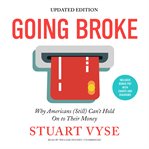Nonfiction
eAudiobook
Details
PUBLISHED
Made available through hoopla
EDITION
DESCRIPTION
1 online resource (1 audio file (13hr., 10 min.)) : digital
ISBN/ISSN
LANGUAGE
NOTES
Narrated by William Hughes
Over the last four decades, debt, bankruptcy, and home foreclosures have risen to epidemic levels, and the personal savings rate has sunk dangerously low. Why, in the richest nation on Earth, can't Americans hold on to their money?First published in 2008, Stuart Vyse's Going Broke described the epidemic of personal debt that existed in the years leading up to the Great Recession, and anticipated the home mortgage crisis that started it. Ten years later, this fully updated new edition tackles the post-recession era of economic recovery. Today total household debt has actually surpassed pre-recession levels, and some of the same problems that preceded the crash are back again. But the shape of our troubles has changed: the new face of financial failure features auto repossession, bankruptcy, eviction, wage garnishment, and being sued for unpaid bills. Vyse offers a unique psychological perspective on the financial behavior of the many Americans today who find they cannot make ends meet, illuminating these and other causes of our wildly self-destructive spending habits. But he doesn't entirely blame the victim, arguing instead that the mountain of debt burying so many of us is the inevitable byproduct of America's turbo-charged economy together with social and technological trends that undermine our self-control. This new edition illuminates everything from the rise of the credit card and ballooning student loan debt, to the expansion of new shopping opportunities provided by social media, revealing how vast changes in American society over the last forty years have greatly complicated our relationship with money. Vyse concludes with both personal advice for the individual who wants to achieve greater financial stability and with pointed recommendations for economic and social change that will help promote the financial health of all Americans
Mode of access: World Wide Web







